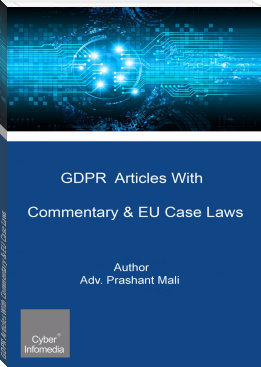GDPR Articles With Commentary & EU Case Laws - Adv. Prashant Mali (bill gates book recommendations .TXT) 📗

- Author: Adv. Prashant Mali
Book online «GDPR Articles With Commentary & EU Case Laws - Adv. Prashant Mali (bill gates book recommendations .TXT) 📗». Author Adv. Prashant Mali
Support by the processor
The processor should assist the controller, where necessary and upon request, in ensuring compliance with the obligations deriving from the carrying out of data protection impact assessments and from prior consultation of the supervisory authority.
Consultation of the supervisory authority in the course of a legislative process
A consultation of the supervisory authority should also take place in the course of the preparation of a legislative or regulatory measure which provides for the processing of personal data, in order to ensure compliance of the intended processing with this Regulation and in particular to mitigate the risk involved for the data subject.
Data protection officer
Where the processing is carried out by a public authority, except for courts or independent judicial authorities when acting in their judicial capacity, where, in the private sector, processing is carried out by a controller whose core activities consist
of processing operations that require regular and systematic monitoring of the data subjects on a large scale, or where the core activities of the controller or the processor consist of processing on a large scale of special categories of personal data and data relating to criminal convictions and offences, a person with expert knowledge of data protection law and practices should assist the controller or processor to monitor internal compliance with this Regulation. In the private sector, the core activities of a controller relate to its primary activities and do not relate to the processing of personal data as ancillary activities. The necessary level of expert knowledge should be determined in particular according to the data processing operations carried out and the protection required for the personal data processed by the controller or the processor. Such data protection officers, whether or not they are an employee of the controller, should be in a position to perform their duties and tasks in an independent manner.
Preparation of codes of conduct by organisations and associations
Associations or other bodies representing categories of controllers or processors should be encouraged to draw up codes of conduct, within the limits of this Regulation, so as to facilitate the effective application of this Regulation, taking account of the specific characteristics of the processing carried out in certain sectors and the specific needs of micro, small and medium enterprises. In particular, such codes of conduct could calibrate the obligations of controllers and processors, taking into account the risk likely to result from the processing for the rights and freedoms of natural persons.
Consultation of stakeholders and data subjects in the development of codes of conduct
When drawing up a code of conduct, or when amending or extending such a code, associations and other bodies representing categories of controllers or processors should consult relevant stakeholders, including data subjects where feasible, and have regard to submissions received and views expressed in response to such consultations.
Certification
In order to enhance transparency and compliance with this Regulation, the establishment of certification mechanisms and data protection seals and marks should be encouraged, allowing data subjects to quickly assess the level of data protection of relevant products and services.
General principles for international data transfers
Flows of personal data to and from countries outside the Union and international organisations are necessary for the expansion of international trade and international cooperation. The increase in such flows has raised new challenges and concerns with regard to the protection of personal data. However, when personal data are transferred from the Union to controllers, processors or other recipients in third countries or to international organisations, the level of protection of natural persons ensured in the Union by this Regulation should not be undermined, including in cases of onward transfers of personal data from the third country or international organisation to controllers, processors in the same or another third country or international organisation. In any event, transfers to third countries and international organisations may only be carried out in full compliance with this Regulation. A transfer could take place only if, subject to the other provisions of this Regulation, the conditions laid down in the provisions of this Regulation relating to the transfer of personal data to third countries or international organisations are complied with by the controller or processor.
International agreements for an appropriate level of data protection
This Regulation is without prejudice to international agreements concluded between the Union and third countries regulating the transfer of personal data including appropriate safeguards for the data subjects. Member States may conclude international agreements which involve the transfer of personal data to third countries or international organisations, as far as such agreements do not affect this Regulation or any other provisions of Union law and include an appropriate level of protection for the fundamental rights of the data subjects.
Appropriate level of data protection based on an adequacy decision
The Commission may decide with effect for the entire Union that a third country, a territory or specified sector within a third country, or an international organisation, offers an adequate level of data protection, thus providing legal certainty and uniformity throughout the Union as regards the third country or international organisation which is considered to provide such level of protection. In such cases, transfers of personal data to that third country or international organisation may take place without the need to obtain any further authorisation. The Commission may also decide, having given notice and a full statement setting out the reasons to the third country or international organisation, to revoke such a decision.
Criteria for an adequacy decision
In line with the fundamental values on which the Union is founded, in particular the protection of human rights, the Commission should, in its assessment of the
3053
third country, or of a territory or specified sector within a third country, take into account how a particular third country respects the rule of law, access to justice as well as international human rights norms and standards and its general and sectoral law, including legislation concerning public security, defence and national security as well as public order and criminal law. The adoption of an adequacy decision with regard to a territory or a specified sector in a third country should take into account clear and objective criteria, such as specific processing activities and the scope of applicable legal standards and legislation in force in the third country. The third country should offer guarantees ensuring an adequate level of protection essentially equivalent to that ensured within the Union, in particular where personal data are processed in one or several specific sectors. In particular, the third country should ensure effective independent data protection supervision and should provide for cooperation mechanisms with the Member States’ data protection authorities, and the data subjects should be provided with effective and enforceable rights and effective administrative and judicial redress.
Consideration of international agreements for an adequacy decision
Apart from the international commitments the third country or international organisation has entered into, the Commission should take account of obligations arising from the third country’s or international organisation’s participation in multilateral or regional systems in particular in relation to the protection of personal data, as well as the implementation of such obligations. In particular, the third country’s accession to the Council of Europe Convention of 28 January 1981 for the Protection of Individuals with regard to the Automatic Processing of Personal Data and its Additional Protocol should be taken into account. The Commission should consult the Board when assessing the level of protection in third countries or international organisations.
Monitoring and periodic review of the level of data protection
The Commission should monitor the functioning of decisions on the level of protection in a third country, a territory or specified sector within a third country, or an international organisation, and monitor the functioning of decisions adopted on the basis of Article 25(6) or Article 26(4) of Directive 95/46/EC. In its adequacy decisions, the Commission should provide for a periodic review mechanism of their functioning. That periodic review should be conducted in consultation with the third country or international organisation in question and take into account all relevant developments in the third country or international organisation. For the purposes of monitoring and of carrying out the periodic reviews, the Commission should take into consideration the views and findings of the European Parliament and of the Council as well as of other relevant bodies and sources. The Commission should evaluate, within a reasonable time, the functioning of the latter decisions and report any relevant findings to the Committee within the meaning of Regulation (EU) No
182/2011 of the European Parliament and of the Council (12) as established under this Regulation, to the European Parliament and to the Council.
Amendment, revocation and suspension of adequacy decisions
The Commission may recognise that a third country, a territory or a specified sector within a third country, or an international organisation no longer ensures an adequate level of data protection. Consequently the transfer of personal data to that third country or international organisation should be prohibited, unless the requirements in this Regulation relating to transfers subject to appropriate safeguards, including binding corporate rules, and derogations for specific situations are fulfilled. In that case, provision should be made for consultations between the Commission and such third countries or international organisations. The Commission should, in a timely manner, inform the third country or international organisation of the reasons and enter into consultations with it in order to remedy the situation.
Appropriate safeguards
In the absence of an adequacy decision, the controller or processor should take measures to compensate for the lack of data protection in a third country by way of appropriate safeguards for the data subject. Such appropriate safeguards may consist of making use of binding corporate rules, standard data protection clauses adopted by the Commission, standard data protection clauses adopted by a supervisory authority or contractual clauses authorised by a supervisory authority. Those safeguards should ensure compliance with data protection requirements and the rights of the data subjects appropriate to processing within the Union, including the availability of enforceable data subject rights and of effective legal remedies, including to obtain effective administrative or judicial redress and to claim compensation, in the Union or in a third country. They should relate in particular to compliance with the general principles relating to personal data processing, the principles of data protection by design and by default. Transfers may also be carried out by public authorities or bodies with public authorities or bodies in third countries or with international organisations with corresponding duties or functions, including on the basis of provisions to be inserted into administrative arrangements, such as a memorandum of understanding, providing for enforceable and effective rights for data subjects. Authorisation by the competent supervisory authority should be obtained when the safeguards are provided for in administrative arrangements that are not legally binding.
Standard data protection clauses
The possibility for the controller or processor to use standard data-protection clauses adopted by the Commission or by a supervisory authority should prevent
3073
controllers or processors neither from including the standard data-protection clauses in a wider contract, such as a contract between the processor and another processor, nor from adding other clauses or additional safeguards provided that they do not contradict, directly or indirectly, the standard contractual clauses adopted by the Commission or by a supervisory authority or prejudice the fundamental rights or freedoms of the data subjects. Controllers and processors should be encouraged to provide additional safeguards via contractual commitments that supplement standard protection clauses.
Binding corporate rules
A group of undertakings, or a group of enterprises engaged in a joint economic activity, should be





Comments (0)